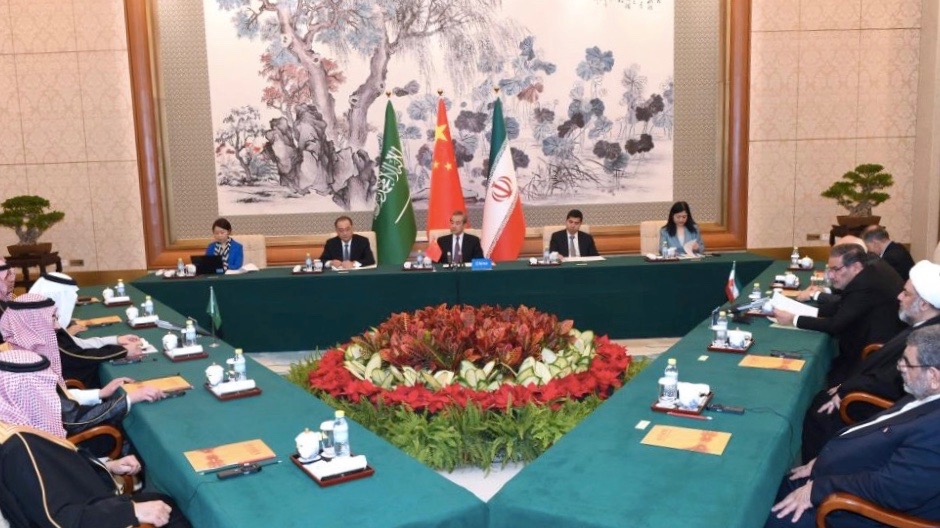China brokered a deal between Iran and Saudi Arabia recently, paving the way for the restoration of full diplomatic relations between the two countries that have long been rivals in regional politics. The deal has generated hope of a positive impact on regional politics as well, and has also increased the likelihood of the resolution of some long-standing conflicts.
The deal, if implemented in its totality, may assist the process of ending the nine-year-old war in Yemen, help find a resolution to the political deadlock in Lebanon, and result in establishing greater stability in Iraq, as both Iran and Saudi Arabia have considerable influence in all three countries.
A key question is if the deal can lead to the reduction of the significance of imperialist interventions, particularly from the US, in the region.
War in Yemen
Ansar Allah, or the Houthi movement, has close political links with Iran, as the latter is the only major country in the region that has stood on its side in the war against the Saudi Arabia-led international coalition.
Iran has maintained that the Houthis are its political allies and denied claims—made by both the Saudis and their Western backers like the US—that the Houthis are merely an Iranian proxy. It has also categorically denied Saudi and US allegations that it is supplying weapons to the Houthis.
Saudi Arabia, on the other hand, has openly supported anti-Houthi forces, and is leading the international coalition that tried to restore fugitive President Abdrabbuh Mansur Hadi’s rule before the creation of an eight-member presidential council. The Saudis have also imposed a punitive land, sea, and air blockade of Yemen, depriving it of essential commodities and causing large-scale starvation and death. Saudi interventions were supposedly an attempt to prevent Iranian encirclement.
In the aftermath of the deal, observers are hopeful that the Saudis may push their allies in the country to be more open towards accommodating Houthi grievances and reach a negotiated settlement of outstanding issues.
There are reports that indicate that, since the deal was announced, negotiations among the warring parties in Yemen have progressed faster than before.
Political deadlock in Lebanon
In Lebanon, political groups have been divided over the role of Hezbollah in the country’s politics, and Saudi Arabia has been one of the main international players to give weight to such concerns. Hezbollah has been perceived, much like the Houthis, as a proxy of Iran, and its rise in Lebanese politics—it is the largest party in the Lebanese parliament—is seen as a sign of rising Iranian influence.
Iranians and Hezbollah have talked about an ideological alliance and cooperation. They have similar stances on various issues, including the occupation of Palestine and status of Israel. Both have backed Bashar al-Assad’s government in Syria, and opposed the Saudi-led war in Yemen.
Saudi influence over Lebanese politics comes from the fact that it has been a major source of financial aid and is the largest source of remittances to the country, which constitute anywhere between 27% of Lebanon’s GDP, as per the World Bank, to 53%, according other sources, the highest in the world. Given the grim economic situation in the country, the significance of these remittances becomes even more important. According to estimates from various sources, between 15% and 30% of Lebanese households were dependent on remittances in 2022.
Saudi Arabia has on occasion openly expressed concern about the role of Hezbollah in Lebanese politics. The deep mistrust of Hezbollah is evident in incidents such as former Lebanese Prime Minister Saad Hariri’s resignation during his trip to Riyadh in 2017, and in 2021, when Saudi Arabia and some other Gulf countries withdrew their ambassadors from Lebanon, temporarily, following criticism of the war in Yemen by one of the ministers in Najib Mikati’s caretaker government.
During the 2021 incident, Saudi Foreign Minister Prince Faisal bin al-Saud had explicitly asked the Lebanese government to take steps to free “Lebanon from the current political construct, which reinforces the dominance of Hezbollah.”
Lebanon currently does not have a full-fledged government, despite conducting national elections in May last year. The antagonism of Saudi allies to Hezbollah and its allies and the subsequent polarization of politics is a key reason. It remains to be seen if the reconciliation between Saudi Arabia and Iran will lead to Lebanon emerging from its economic and political crisis.
Hezbollah chief Hasan Nasrallah welcomed the deal and expressed hope, saying that “if it proceeds in its natural course it could open up horizons in the entire region, including in Lebanon.”
Stability in Iraq
It was in Iraq that the first rounds of talks for reconciliation between Saudi Arabia and Iran were held. Iraq shares borders with both these countries, and both have a large political and economic stake in its stability. Both the Saudis and the Iranians have been trying to seek allies in Iraq ever since the US-led invasion of the country in 2003. They have also been accusing each other of fomenting trouble in the country and aiding hostile actors.
Saudi Arabia has time and again leveled charges about the role of the so-called Iran-backed parties and militias in Iraq, even alleging that these were responsible for a strike on its oil facilities in 2019. It has also accused Iranians of weaponizing anti-Saudi forces in Iraq, and preparing for attacks in the future.
When Iranian General Qassem Soleimani was assassinated by the US in January 2020 in Baghdad, the media in Saudi Arabia reportedly celebrated, with Saudis leaders calling his death a wake-up call for Iranians.
If the reconciliation between Iran and Saudi Arabia continues and matures, US influence in Iraq may face a further hit. The Iraqi parliament had in 2020 passed a resolution demanding the withdrawal of US armed forces from the country, a demand that may get strengthened.





